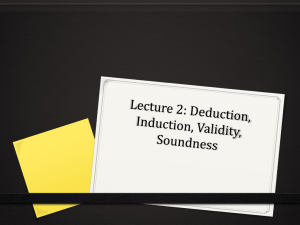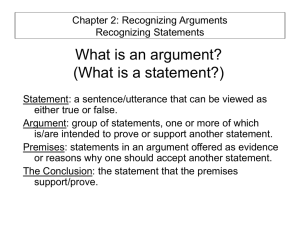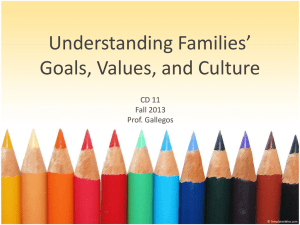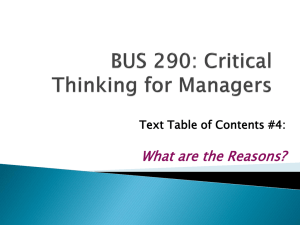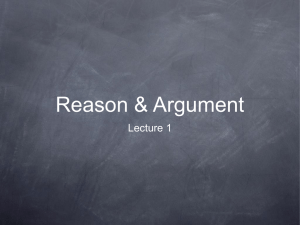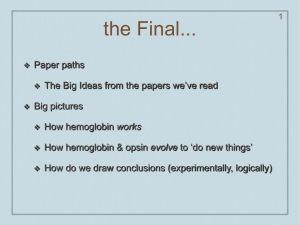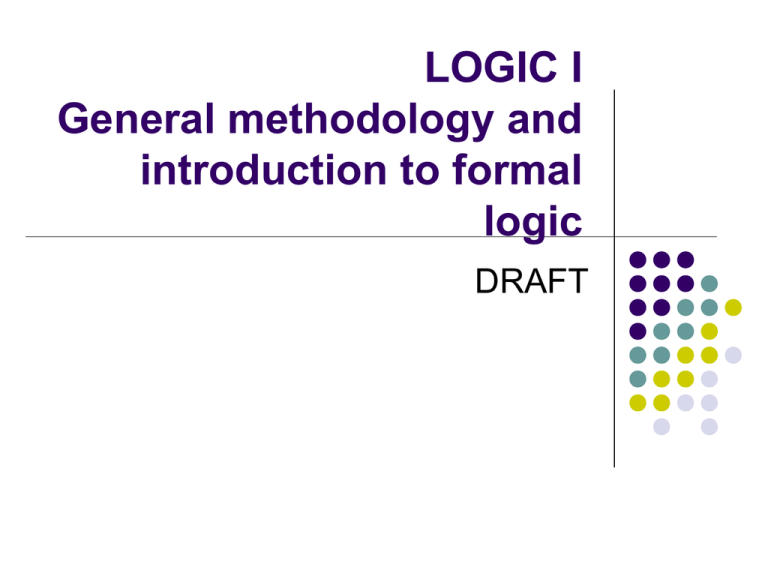
LOGIC I
General methodology and
introduction to formal
logic
DRAFT
Lectures on informal logic are based on
books by Fogelin & Sinnot-Armstrong, Fisher
and Thomson and on lectures by Jesper
Kallestrup.
Lecture I
Informal reasoning
Skills:
- recognizing reasoning (arguments)
- identifying conclusions
- identifying reasons (premises) and
assumptions
- evaluating reasoning
Logical theory
Semantic relationships
(relationships between
true or false
propositions)
Argument = set of
propositions
Context irrelevant
Logical pragmatics
Use of propositions by
an arguer to carry out
the goal of dialogue
(e.g. convince or
persuade the second
arguer)
A seaman drafted to our ship just before we sailed
form Halifaxhad never seen his new captain, who at
sea often went hatless and wore a nondescript
jacket.
The new man had just begun a forenoon watch on the
gun deck when the captain came along. The skipper
suddennly stooped and picked up a butted cigarette.
He trust the butt at the seaman and demanded: „I
want to know who the hell owns this damned thing”
The new hand considered for a moment, then said
slowly to the rankless, hatless officer: „I’d say you
do, mate. You found it.”
Context of dialoge
Seaman: the ownership of the cigarette butt
Captain: the issue of keeping the ship clean
Types of argumentative
dialogue
Dialogue – a sequence of exchanges of messages or speech acts
(typically questions and replies) between two (or more) participants
Every dialogue has a goal and requires cooperation between the
participants to fulfill the goal
Each participant has an obligation to work toward fulfilling his own
goal in the dialogue and also an obligation to cooperate with the
other participant’s fulfillment of his own goal
One context of dialogue is the personal quarrel. A
quarrel is a dialogue in which one tries to trick, cheat or
even attack one’s opponent directly, rather than one’s
opponent’s views, using abusive language, appeal to
emotions, intimidation, one-sided criticism, etc. Any
means are available no matter whether they are fair or
reasonable.
Aggressive personal attack
Appeal to emotions
Desire to win the argument at all costs
A second context of dialogue is the (forensic)
debate. In debates there are judges or referees
who decide, maybe by voting, which side has
the better argument. There are rules of
procedure that determine who may speak and
when and for how long. There are also some
rules that disallow the more severe forms of
personal attack, but many fallacious arguments
may still be tolerated.
Audience
Rules are often very permissive and may
allow fallacious arguments
Goal: win a verbal victory to impress the
audience
A third context of dialogue is the persuasion dialogue (critical
discussion). There are two participants each of whom has a
thesis to prove. Internal proof by a participant means proof by
inferring a proposition from the other participant’s concession in
the dialogue. External proof is the introduction of new facts into
the argument by appealing to scientific evidence or expert
opinion. The best one can hope for is plausible commitment to an
opinion based on reasoned evidence.
My goal is to persuade you of my thesis; hence I should prove
that thesis from premises that you accept or are committed to
Your goal is to prove your thesis from the premises that I accept
or am committed to
Goal – persuade the other party of your thesis
Method – prove your thesis
A forth context of dialogue is the inquiry in
which premises can only be propositions that
are known to be true, that have been
established to the satisfaction of all parties to
the inquiry. The inquiry seeks out as much
certainty as can be obtained by the given
evidence. The goal is to accumulate
knowledge. The participants are neutral
investigators of an objective truth. The inquiry
is cooperative rather than adversarial.
In negotiation dialogue, the primary goal is
self-interest and the method is to bargain.
Bargaining makes no pretensions to be an
objective inquiry into the truth of the matter.
Logical proof is not important
Frankly based on personal gain
Not neutral, not objective
Interest-based conflict
Information-seeking dialogue – one party
has the goal of finding infromation that the
other party is believed to possess
Action-seeking dialogue – one party has
the goal to bring about a specific course of
action by the other party
Educational dialogue – one party (the
teacher) has the goal of imparting knowledge
to the other party (the student)
dialogue
initial situation
method
goal
quarrel
Emotional disquiet Personal attack
„Hit” out at other
debate
Forensic contest
Verbal victory
Impress audience
Persuasion
(critical
discussion)
Difference of
opinion
Internal and
external proof
Persuade other
inquiry
Lack of proof
Knowledge-based
argumentation
Establish proof
negotiation
Difference of
interests
bargaining
Personal gain
Info-seeking
Lacking
information
questioning
Find information
Action-seeking
Need for action
Issue imperatives
Produce action
educational
ignorance
teaching
Imparting
knowledge
Arguments
Socrates is a man.
All men are mortal.
Socrates is mortal.
Since Socrates is a man and
all men are mortal,
Socrates is mortal.
Socrates is a man,
since all men are mortal and
Socrates is mortal.
Socrates is a man.
All men are mortal.
Therefore Socrates is mortal.
Since Socrates is a man,
all men are mortal and
Socrates is mortal.
An argument is a train of reasoning aimed at
establishing a particular claim, the conclusion, from
a number of other claims, the premises. The
premises are offered as reasons to believe or accept
the conclusion. Arguments attempt to persuade
others to accept a claim by offering reasons or
evidence in support of that claim. One must do two
things in propounding an argument: justify the
premises by providing reasons or evidence, and
show how the conclusion follows from the premises.
The bus is late. It must have broke down.
That bird can’t be a robin. It doesn’t have a
red breast.
You should try to appear confident in your job
interview. The employers are looking for
someone who can speak confidently in
public.
He must be older than he says. He told us he
was forty-two, but he has a daughter who is
at least thirty years old.
She didn’t turn up for their date. She
obviously doesn’t really want to be his
girlfriend. If she’d wanted a serious
relationship with him she wouldn’t have
missed the date.
The engine won’t fire. The carburettor must
be blocked.
Reason indicators
Because ….
For ….
Since ….
Follows from the fact that …..
The reason being …..
Firstly, ….secondly,
May be inferred from the fact that ….
Conclusion indicators
Therefore
So
Hence
Thus
Accordingly
Consequently
Which proves that
Justifies the belief that
I conclude that
Which implies that
Which allows us to infer that
It follows that
Establishes the fact that
Demonstrates that
(1) People who diet lose weight. Wojciech
Mann cannot have dieted. He hasn’t lost
weight.
(1*)
People who diet lose weight. But
Wojciech Mann hasn’t lost weight.
(Therefore), he cannot have dieted.
(1**)
People who diet lose weight. But
Wojciech Mann cannot have dieted.
Therefore, he hasn’t lost weight.
People who diet lose weight. Wojciech Mann
is a good journalist despite his weight.
Wojciech Mann would be a better journalist if
he dieted.
(1***)
People who diet lose weight. Since
Wojciech Mann hasn’t lost weight, he cannot
have dieted.
John broke the window because he tripped.
John broke the window because he has
forgotten his key.
John must have broken the window because
he was the only person in the house.
Indicative conditional vs.
argument
If international terrorism continues to grow,
there will be a worldwide crisis.
Since international terrorism continues to
grow, there will be a worldwide crisis.
Standard form of arguments
Socrates is a man.
All men are mortal.
_____________________
Socrates is mortal.
Since Chicago is north of Boston, and
Boston is north of Charleston, Chicago is
north of Charleston.
Toward evening, clouds formed and the sky
grew darker; then the storm broke.
Both houses of Congress may pass the bill,
but the President may still veto it.
Texas has a greater area than Topeka, and Topeka
has a greater area than the Bronx Zoo, so Texas
has a greater area than the Bronx Zoo.
Other airlines will carry more passengers because
United Airlines is on strike.
Since Jesse James left town, taking his gang with
him, things have been a lot quieter.
Things are a lot quieter because Jesse James left
town, taking his gang with him.
Witches float, because witches are made of wood,
and wood floats.
The hour is up, so you must hand in your exams.
Joe quit because his boss was giving him so much
grief.
Red squirrels can eat yellow berries, hawthorn
berries and rosehips. Grey squirrels can eat none of
these. However, grey squirrels eat acorns which red
squirrels cannot eat.
In recent years, the demand for computer-literate
personnel has increased. More students are
graduating in computing science than before. Some
companies find that these graduates require further
training before embarking on a career in computing.
The North American Wildlife Federation, which
sponsors an annual watch for endangered species,
reports that sightings of the bald eagle between
1978 and 1979 increased by 35 per cent. In 1979,
13,127 sightings were reported, 3,400 over the 1978
count. This indicates considerable growth in the bald
eagle population.
To make an assessment of modern art is an
impossible task. For one can assess a work of art
only when there are accepted rules and
conventions. Modern art has no rules and
conventions.
If the money supply were to increase at less than
5% the rate of inflation would come down. Since
the money supply is increasing at about 10%
inflation will not come down.
If Russia were unsure about American reactions to
an attack on Western Europe, and if her intentions
were to conquer Western Europe, she would
create local casus belli (causes of war) but since
she has not done this, she cannot intend to
conquer Western Europe.
If the civil population cannot be defended in the event of
nuclear war, we do not need a civil defence policy. But, we do
need a civil defence policy if ‘deterrence’ is to be a convincing
strategy. Therefore deterrence is not a convincing strategy.
The materials of nature (air, earth, water) that remain
untouched by human effort belong to no-one and are not
property. It follows that a thing can become someone’s
property only if he works and labours on it to change its natural
state. From this I conclude that whatever a man improves by
the labour of his hand and brain belongs to him and to him
alone.
The only freedom which deserves the name is that
of pursuing our own good in our own way, so long
as we do not attempt to deprive others of theirs, or
impede their efforts to obtain it. Each is the proper
guardian of his own health, whether bodily, or
mental and spiritual. Mankind are greater gainers
suffering each other to live as seems good to
themselves, rather than by compelling each to live
as seems good to the rest.
Radioactive elements disintegrate and
eventually turn into lead. If matter has
always existed there should be no
radioactive elements left. The presence of
uranium etc. is scientific proof that matter
has not always existed.
If the ‘nuclear winter’ scientists are right the
population of Britain would be virtually
eliminated in a nuclear war between the
superpowers even if Britain suffered no
direct nuclear attack. Quite apart from the
radioactive fall-out, we would suffer the
darkness, the subfreezing temperatures
and the mass starvation of a nuclear winter.
Some people have solved their own
unemployment problem by great ingenuity
in hunting for a job or by willingness to work
for less, so all the unemployed could do
this.
Evaluating arguments
Validity
An argument is valid if and only if (iff) it is not
possible for the premises to be true and the
conclusion false.
All ministers are paid.
Radosław Sikorski is a minister.
_________________
Radosław Sikorski is paid.
All ministers are paid.
Radosław Sikorski is paid.
_________________
Radosław Sikorski is a ministrer.
All MPs are paid.
Bronisław Komorowski is paid.
___________________
Bronisław Komorowski is an MP.
Truth
All MPs are paid.
Bronisław Komorowski is an MP.
___________________
Bronisław Komorowski is paid.
Soundness
An argument is sound iff it is valid and all of its
premises are true.
All premises
true
At least one
false premise
VALID
SOUND
UNSOUND
INVALID
UNSOUND
UNSOUND
Truth and falsity are properties of claims,
propositions or statements
Validity and soundness are properties of
arguments
Valid arguments are truth-preserving.
If the argument is invalid, it cannot establish its conclusion.
But it may still be a reasonable or persuasive argument by some
other standards. It may be that the premises lend inductive
support to the conclusion.
Inductive arguments do not guarantee the truth of their
conclusion, but yield more or less highly probable conclusions.
Or it may be that the truth of the conclusion is the best
explanation of the truth of the premises.
When we talk about validity, we typically mean deductive validity.
Valid or invalid?
If John has drunken seven pints of lager, then
he can’t ride his bike. John can’t ride his bike.
So, John has drunken seven pints of lager.
If it rains tomorrow, then the match will be
cancelled. If the trains are not running
tomorrow, then the match will be cancelled.
Therefore, if it rains tomorrow, then the trains
are not running tomorrow.
Most electors prefer A to B
Most electors prefer B to C
_________________________
Most electors prefer A to C
1/3
1/3
1/3
1
A
C
B
2
B
A
C
3
C
B
A
Sound or unsound?
If George Bush will invade Russia, then Tony
Blair is not a conservative MP. Tony Blair is a
conservative MP. So, George Bush will not
invade Russia.
Either Hugh Grant is German or PO won the
last election. PO won the last election. So,
Hugh Grant is not German.
Any argument must take something for
granted. Basic reasons or basic premises are
those that are presented without themselves
being supported by other reasons or
premises.
When a passage contains more than one premise
we need find out whether joint reasons or
independent reasons are being offered.
It is right to ban cigarette advertising because it
encourages young people to start smoking. But
even if it had no such influence on young people, it
would be right to ban smoking because it could give
existing smokers the mistaken impression that their
habit is socially acceptable.
If the money supply were to increase at less
than 5% the rate of inflation would come
down. Since the money supply is increasing
at about 10% inflation will not come down.
Some arguments are very complex in that
they may contain an intermediate conclusion
and a main conclusion. So, first premises are
advanced in support of an intermediate
conclusion, and then that conclusion itself
features as a premise that is advanced
together with other premises in support of the
main conclusion.
A majority of prospective parents would
prefer to have sons rather than daughters.
So, if people can choose the sex of their
child, it is likely that eventually there will be
many more males than females in the
population. A preponderance of males in the
population is likely to produce serious social
problems. Therefore, we should discourage
the use of techniques which enable people to
choose the sex of their child.
There is no way I can finish my paper before
the 9 o’clock show, since I have to do the
reading first, so I won’t even start writing until
at least 9 o’clock.
I have to do the reading first.
I won’t even start writing until at least 9 o’clock.
________________________
There is no way I can finish my paper before
the 9 o’clock show.
I have to do the reading first.
_______________________
I won’t even start writing until at least 9 o’clock.
__________________________
There is no way I can finish my paper before
the 9 o’clock show
Assumptions = suppressed
(unstated) premises
We need to distinguish between premises,
conclusions and assumptions. An assumption
is something that is taken for granted in an
argument without being explicitly stated.
Assumptions function in arguments either by
giving support to the basic premises, or as a
missing step within the argument—maybe as
an additional premise that needs to be added
in order for the conclusion to follow from the
existent premises.
The burglar must have left by the fire escape.
This person is not in the building now, but has
not been seen leaving the building, and there
are guards posted at each entrance.
Unstated premises:
Shared facts
Linguistic principles
Harriet is in New York with her son.
_____________________
Harriet’s son is in New York.
Donald Tusk cannot become president of the
United States because he was born in
Poland.
Other kinds
You shouldn’t buy pornography, because it
leads to violence toward women.
An argument based on suppressed premises
is called an enthymeme and is said to be
enthymematic.
argument
Some people say that the depiction of
violence on television has no effect on
viewer’s behaviour. However, if what was
shown on television did not affect behaviour,
television advertising would never influence
viewers to buy certain products. But we know
that it does. So it cannot be true that
television violence does not affect behaviour.
Interpretation I
Basic reason: Television advertising affect
viewers’ behaviour
Assumption: Television advertising and
television violence are similar in that if one
affects the behaviour of viewers, so does the
other
Conclusion: Television violence affects
behaviour
Interpretation 2
Basic reason 1:
Television advertising
affect viewers’ behaviour
Intermediate conclusion: What is shown on
television affects viewers’ behaviour
Main conclusion: Television violence
affects viewers’ behaviour
Assert, assume, suppose
To assert is to claim that something is true, or to present
something as true. Assertions are expressed by means of
assertoric sentences, e.g. ‘the window is closed’. Premises and
conclusions of arguments are asserted propositions. To assert
that p is typically to express the belief that p.
To assume is to take something for granted without actually
mentioning or asserting it. Assumptions (suppressed premises)
are typically implicit, but can be made explicit by means of
assertoric sentences.
To suppose is to take something for granted for the sake of
argument. Suppositions are explicit, but are not asserted. To
suppose that p needn’t express belief or acceptance that p. P
isn’t presented as being true, but is put forward so that we may
consider its implications. The supposition that p is often made in
order to conclude that p is false.
Supposing for the sake of
argument that ....
suppositional arguments
In suppositional arguments, p is supposed to be true
by the arguer. But the arguer doesn’t have to believe
that p.
Suppose Darwin’s theory of evolution is true. Then
there should be fossil evidence which shows
species changing and evolving, but this evidence
simply doesn’t exist so Darwin’s theory must be
wrong.
In suppositional arguments the arguer often
believes or knows that p is false. The arguer
asks us to consider p with a view to drawing
out its implications—implications which he
takes to be implausible.
Supposition indicators:
Suppose that ...
Let us assume that...
Imagine that...
Consider the hypothesis/theory that...
Let us postulate that...
Conditionalisation
Suppose we have an argument which
proceeds from some supposition R to the
conclusion C by logically valid steps (i.e. the
conclusion at each step follows from the
reasons given for it) then the validity of the
argument entitles us to infer the conditional
(hence the name ‘conditionalisation’), if R
then C.
Rule
If we have an argument which proceeds from
a supposition R to a conclusion C and then
conditionalises to the conclusion „if R then
C”, whether this conditional conclusion is
established does not depend on the truth of
R. If other basic reasons are true and the
argument is sound, „if R then C” is
established whether R is true or false.
Suppose that Einstein’s theory of relativity is
true. Then it follows that everything is
relative. So, it follows that there are no
absolute moral values. So, if Einstein’s theory
of relativity is true, then there are no absolute
moral values.
Suppose that u<Einstein’s theory of relativity
is true>. Then it follows that u<everything is
relative>. So, it follows that u<there are no
absolute moral values>. So, if Einstein’s
theory of relativity is true, then there are no
absolute moral values.
Galileo’s argument
Suppose (as Aristotle believed) that the heavier a body is, the
faster it falls to the ground and suppose that we have two bodies,
a heavy one called H and a light one called L. Under our initial
assumption, H will fall faster than L. Now suppose that H and L
are joined together thus L/H. Now what happens? Well, L/H is
heavier than H, so by our initial assumption it should fall faster
than H alone. But in the joined body L/H L and H will each tend to
fall just as fast as before they were joined, so L will act as a
brake on H and L/H will fall slower than H alone. Hence it follows
from our initial assumption that L/H will fall both faster and slower
than M alone. Since this is absurd, our initial assumption must be
false.
This style of reasoning is called reductio ad
absurdum: a particular claim is supposed for
the sake of argument. Then an absurdity - a
contradiction for instance - is deduced via
logically valid steps.
Induction versus deduction
All ravens are black.
______________
If there is a raven on top of Mount Blanc, then it
is black.
All ravens we have observed are black.
_________________________
All ravens are black.
Deductive: P1, ..., Pn; therefore Q
Inductive: P1, ..., Pn; therefore Q is very
likely to be true
Strong/weak
All ravens are black.
______________
If there is a raven on top of Mount Blanc, it is
black.
All observed ravens have been black.
______________
If there is a raven on top of Mount Blanc, it is
black.
Deductive – monotonic; conclusive support;
hard to establish the truth of the premise
Inductive – nonmonotonic; partial support
The sun is coming out, so the rain should
stop soon.
It’s going to rain tomorrow, so it is either
going to rain or going to be clear tomorrow.
Inductive generalizations
In the past, when I tried to use 1 Euro coins in
Polish supermarket trolleys, they have not
worked.
_________________
1 Euro coins do not work in Polish supermarket
trolleys.
Opinion polls; samples
samples
Unfair/biased
Large enough (not affected by runs of luck)
Representative
Phrasing of questions may influence the
outcome
Slanted questions
Which do you favour:
(a) preserving a citizen’s constitutional right to
bear arms or
(b) leaving honest citizens defenseless against
armed criminals?
Which do you favour:
(a) restricting the sale of assault weapons or
(b) knuckling under to the demands of the wellfinanced gun lobby?
Informal judgmental heuristics
General strategy for solving a problem; we
rely too heavily on them
The representative heuristics
You are randomly dealt five-card hands from
a standard deck.
Which of the following two hands is more
likely to come up?
(1)
Three of clubs
Seven of diamonds
Nine of diamonds
Queen of hearts
King of spades
(2)
Ace of spades
Ace of hearts
Ace of clubs
Ace of diamonds
King of spades
Unimpressive strikes us as representative
Linda is 31 years old, single, outspoken and
very bright. She majored in philosophy. As a
student, she was deeply concerned with
issues of discrimination and social justice,
and also participated in anti-nuclear
demonstrations.
Rank the following statements with respect to the
probability that they are also true of Linda:
Linda is a teacher in elementary school.
Linda works in a bookstore and takes Yoga
classes.
Linda is active in the feminist movement.
Linda is a bank teller.
Linda is an insurance sales person.
Linda is a bank teller and is active in the
feminist movement.
The availability heuristic
In four pages of a novel (about 2000 words),
how many words would you expect to find
that have the form ----ing (seven-letter word
that end with ing)?
In four pages of a novel (about 2000 words),
how many words would you expect to find
that have the form -----nThe median estimates were 13.4 for ----ing
word and 4.7 for -----n- word.
More available to our memory, naturally come
to mind; easier to think of
Is the situation sufficiently standard to allow
the use of informal judgmental heuristics?
Inductive/statistical generalisation: sample
population
Statistical syllogism: population
member/subset
Statistical Syllogisms
Ninety-seven percent of the Republicans in
California voted for Bush.
Marvin is a Republican from California.
______________________
Marvin voted for Bush.
STRONG
Three percent of the socialists in California
voted for Bush.
Maureen is a socialist from California.
_______________
Maureen didn’t vote for Bush.
STRONG
X percent of Fs have the feature G.
a is an F.
__________________
a has/ doesn’t have the feature G.
F – the reference class
Ninety-seven percent of the Republicans in California
voted for Bush.
Marvin is a Republican from California.
______________________
Marvin voted for Bush.
Three percent of Clinton’s relatives voted for Bush.
Marvin is a relative of Clinton.
______________________
Marvin didn’t vote for Bush.
Forty-two percent of Republicans from
California who were relatives of Clinton voted
for Bush.
Marvin is a Republican from Cliafornia who is a
relative of Clinton.
_________________
Marvin voted for Bush.
WEAK
Less than 1 percent of the people in the world
voted for Bush.
Gale is a person in the world.
_______________________
Gale didn’t vote for Bush.
Reasoning about causes
General conditional:
For all x, if x has the feature F, then x has the
feature G.
If something is a square, then it is a
rectangle.
Causal generalizations
For all x, if x has the feature F, then x has the
feature G.
X’s having the feature F is a sufficient
condition for its having the feature G, and
x’s having the feature G is a necessary
condition for its having the feature F.
Causal correlation?
At one time there was a strong negative
correlation between the number of mules in a
state and the salaries paid to professors at
the state university. In other words, the more
mules, the lower professorial salaries.
There is a high positive correlation between
the number of fire engines in a particular
borough in New York City and the number of
fires that occur there.
That F is a sufficient condition for G means
that whenever F is present G is present .
That F is a necessary condition for G
means that whenever F is absent G is
absent.
The sufficient-condition test
(Mill’s Method of Difference)
A, B, C, D – candidates for sufficient conditions
G – target feature
A
B
C
D
G
A
B
C
D
G
A
B
C
D
G
SCT: Any candidate that is present when G is
absent is eliminated as a possible sufficient
condition of G.
The necessary-condition test
(Mill’s Method of Agreement)
A
A
A
B
B
B
C
C
C
D
D
D
G
G
G
NCT: Any candidate that is absent when G is
present is eliminated as a possible necessary
condition of G.
A
A
A
B
B
B
C
C
C
D
D
D
G
G
G
Which of the candidates is not eliminated by SCT?
Which of the candidates is not eliminated by NCT?
Which of the candidates is not eliminated by either
test?
A
A
A
B
B
B
C
C
C
D
D
D
G
G
G
Which of the candidates is not eliminated by SCT?
C
Which of the candidates is not eliminated by NCT?
C, D
Which of the candidates is not eliminated by either
test? C
Inferences to the best
explanation
The idea is that a hypothesis gains inductive
support if, when it is added to our stock of
previously accepted beliefs, it increases our
ability to make reliable predictions and
illuminating explanations.
You come back home and discover that the lock
on your front door is broken and several valuable
objects are missing
Hypotheses:
your house was burglarized;
there was a drug bust and the authorities had
the wrong address;
your friends are playing a strange joke on
you;
a meteorite struck the door and then
vaporized your valuables.
Your house begins to shake so violently that
pictures fall off walls.
Your key will not open the door.
Which explanation is best?
Should contain only true claims
Shouldn’t be obscure
Should be simple
Should be powerfull
Should be conservative
Arguments from analogy
Object A has properties P, Q, R.
Objects B, C, D also have properties P, Q, R.
Objects B, C, D have property X.
_________________
Therefore, object A probably also has the
property X.
P, Q, R, X must be relevant and important
A – minivan Honda Odyssey
B – Honda Civic sedan
P – the same manufacturer
Q – similar engine
R – similar gearbox
X – is reliable
A – minivan Honda Odyssey
B – Ford
P – has a sun roof
Q – has four doors
R – is red
X – is reliable
Strong or weak?
The premises must be true
The cited similarities must be relevant and important
The presence of relevant dissimilarities?
The weaker the conclusion, the stronger the argument:
- The Odyssey will run for ten years without any repairs.
- The Odyssey will probably run for ten years without any repairs.
- The Odyssey will probably run for at least five years without any
repairs.
- The Odyssey will be very reliable.
- The Odyssey will be reliable.
This landscape by Cezanne is beautiful. He
did another painting of a similar scene around
the same time. So it is probably beautiful too.
My aunt had a Siamese cat that bit me, so
this Siamese cat will probably bite me too.
The paradox of the raven
(confirmation)
(R) All ravens are black.
(R-) Nothing which is not black is a raven.
(R) and (R-) are logically equivalent, i.e. they
are true or false together.
What would confirm (R)?
What would confirm (R-)?
Confirmation is not a simple matter of
enumerative induction, that is the mere
accumulation of confirming instances.
Hempel’s solution
It doesn’t have to be absurd.
Let’s suppose that someone observed a
white object. He thinks that it is a raven.
Further observation reveals that it is a
shoe, not a raven.
So it supports (R) in a sense.
Conclusion: when you determine whether
a given information confirms the given
hypothesis you have to take context into
account. The mere logical form does not
settle the issue.
Carl Gustav Hempel
(1905-1997)
Enumerative induction
1st observed swan was white.
2nd observed swan was white.
3rd observed swan was white.
…..
__________________
All swans are white.
Russell’s chicken
1st day – The chicken is fed by the farmer.
2nd day – The chicken is fed by the farmer.
3rd day – The chicken is fed by the farmer.
…..
------------------The farmer comes and wrings its neck.
Grue (New riddle of induction)
All examined emeralds are green.
All examined emeralds are green.
_________________
All emeralds are green.
Grue: x is grue if it is green and examined (by now) or blue and
unexamined (by now).
All examined emeralds are green.
_________________
All emeralds are grue.
Only well-entrenched predicates are
projectible.
Green: x is green if it is grue if examined and
bleen if not.


